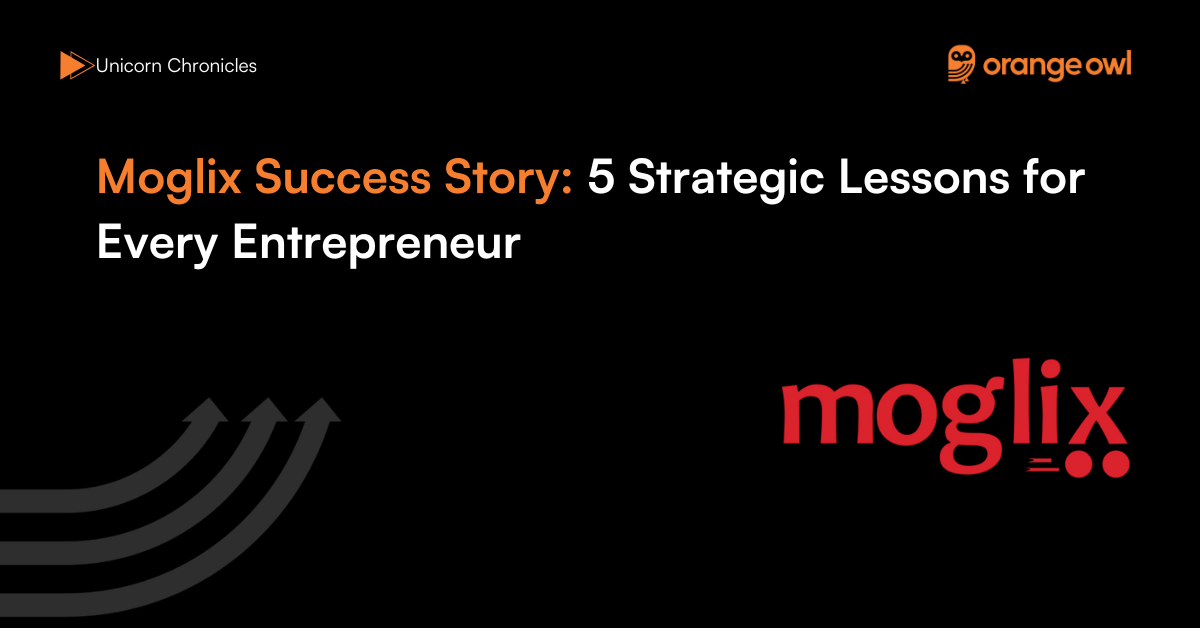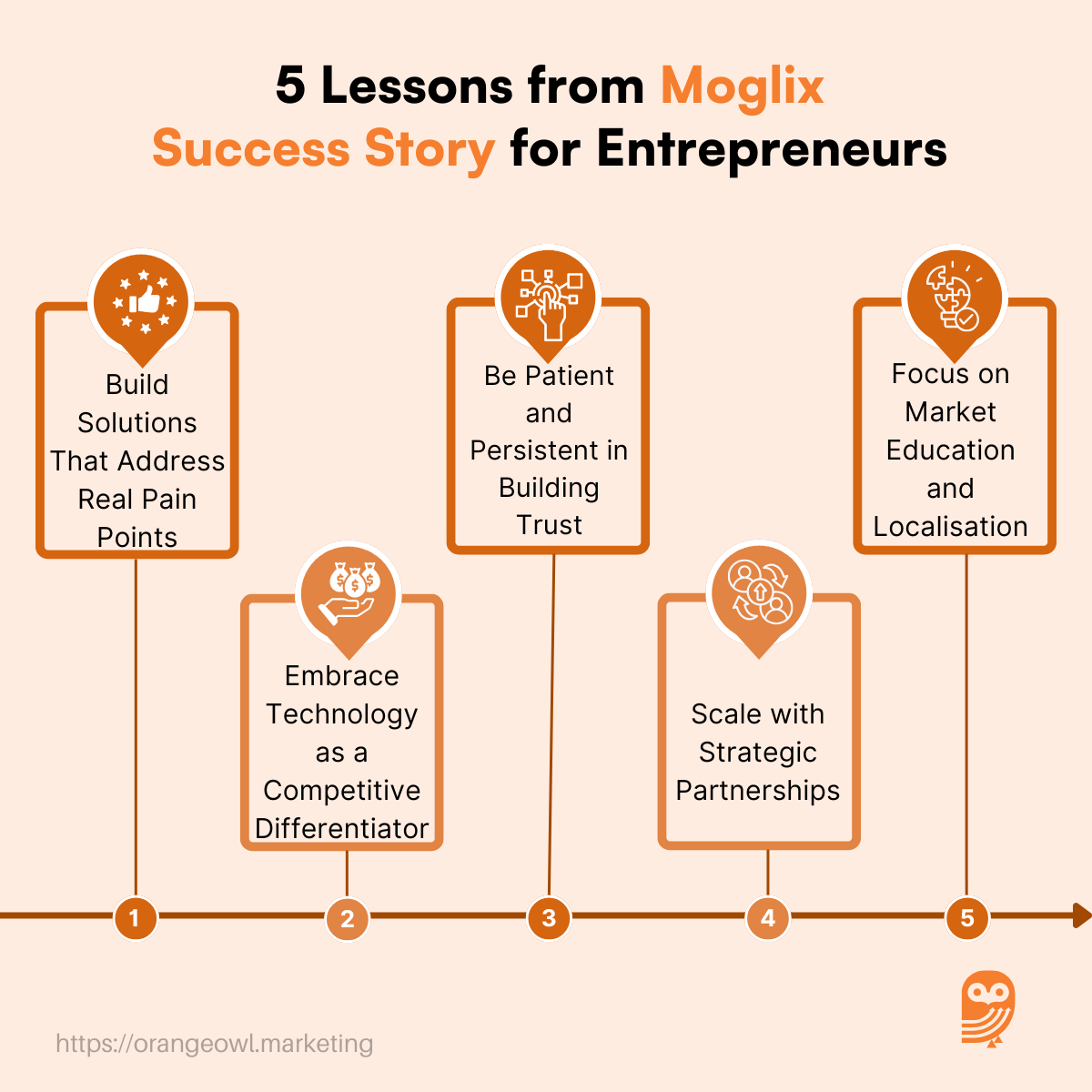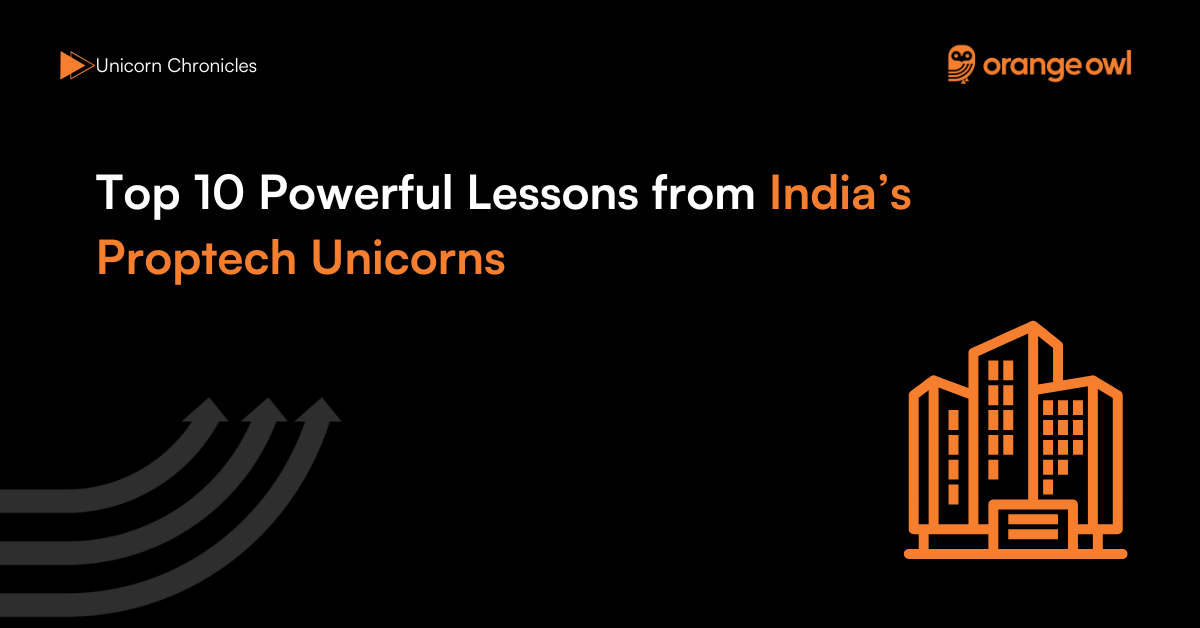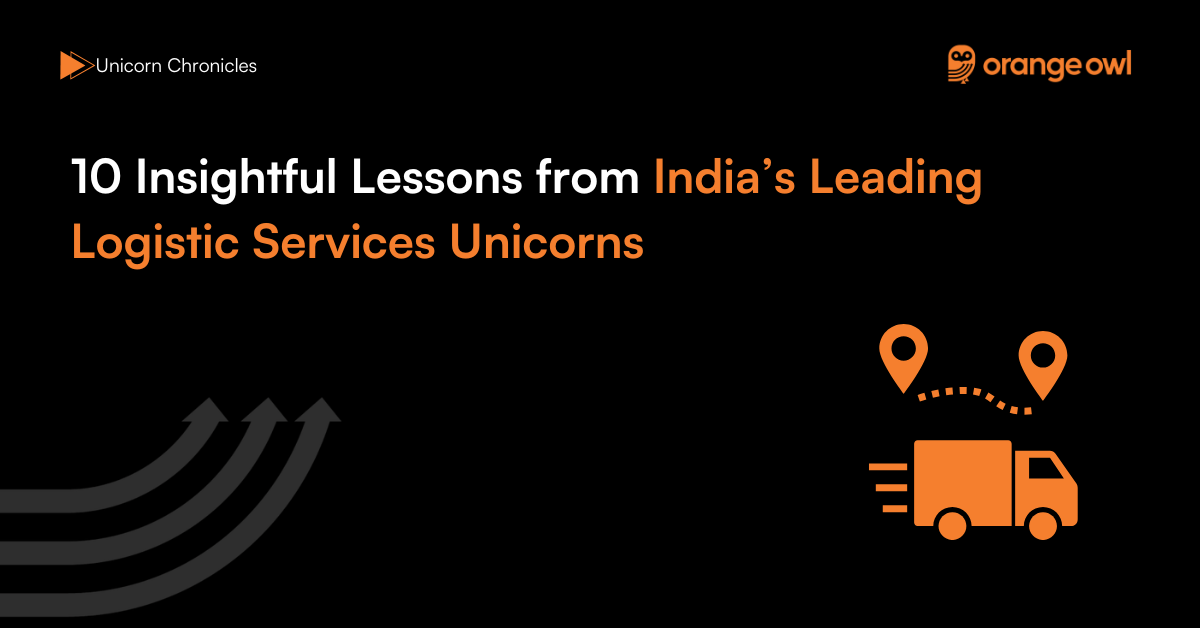Moglix Success Story: 5 Strategic Lessons for Every Entrepreneur
Vivek Goel
June 7, 2025

Table of Contents
Introduction
In the high-stakes world of industrial commerce and clean-tech logistics, the Moglix success story stands out as a benchmark for innovation, resilience, and scale. Founded in 2015 by Rahul Garg, an alumnus of IIT Kanpur and the Indian School of Business (ISB), Moglix has evolved from a fledgling B2B e-commerce startup into a $2.6 billion unicorn, streamlining procurement and supply chains for thousands of manufacturing enterprises across India, Southeast Asia, the Middle East, and the UK.
In FY23, Moglix’s revenue rose sharply to ₹4,160 crore, up 55% from ₹2,682 crore in FY22 — a testament to its strong execution and increasing demand for digital-first, cost-efficient supply chain solutions. The company operates over 40 warehouses and offers more than 700,000 industrial products, making it one of the largest e-commerce players in the manufacturing and infrastructure sector.
Founder Rahul Garg believes Moglix’s mission goes far beyond commerce:
“Whether it’s biofuels or solar, India’s energy transition depends on organising decentralised supply chains. That’s where startups like Moglix can lead — from powering green infrastructure to scaling clean-tech logistics.”
This vision took centre stage at India Energy Week 2025, where Moglix was recognised for playing a pivotal role in building India’s biomass briquette supply chain — a key enabler in reducing dependence on coal and unlocking sustainable energy solutions for the Global South.
The Moglix success story exemplifies how deep-tech, supply chain innovation, and public-private collaboration can create a globally competitive enterprise that is also mission-driven, shaping the future of industrial India and its role in the global energy transition.
Origin Story
The origin of Moglix can be traced back to the innovation-driven halls of Google, where founder Rahul Garg worked as a Senior Product Manager. Armed with degrees from IIT Kanpur and ISB Hyderabad, and having spent years immersed in the Silicon Valley culture of disruptive thinking, Garg identified a glaring gap in India’s manufacturing ecosystem: the lack of streamlined, tech-enabled B2B procurement.
In 2015, he returned to India with a bold vision—to digitise the country’s massive but fragmented industrial supply chain. Drawing inspiration from Alibaba’s B2B model and India’s manufacturing potential, he launched Moglix in Noida as a platform to simplify the procurement of industrial goods like MRO (Maintenance, Repair, and Operations) products, electricals, and safety equipment.
The early days were fraught with challenges. Garg had to convince traditional manufacturers to adopt digital procurement and build trust in a sector still reliant on paper trails and personal networks. But his conviction never wavered.
“We saw a clear opportunity to create value at scale. India’s manufacturing backbone needed more than just digitisation—it needed full-stack transformation,” Garg recalled in a recent interview.
By building a tech-first, customer-centric platform, Moglix focused on solving problems at the intersection of supply chain inefficiency, procurement delays, and lack of pricing transparency. The result? A rapidly scaling business that would soon become a cornerstone of India’s industrial digitisation wave.
From a modest beginning to becoming a unicorn valued at over $2.5 billion, the Moglix success story is a testament to how deep tech, strong execution, and relentless focus on real-world problems can reimagine legacy industries.
Business Space and Early Challenges
Entering the industrial supply chain and procurement sector in India presented significant challenges for Moglix in its early days. The market was highly fragmented, with a large portion of transactions conducted through offline channels, manual processes, and unorganised vendors. The adoption of digital procurement was still in its infancy, and many traditional manufacturers and suppliers were hesitant to shift from familiar, relationship-based business models to online platforms.
Another major hurdle was building trust among industrial buyers and suppliers, who were wary of making large transactions on a digital platform. Convincing businesses to rely on Moglix’s technology-driven approach required persistent efforts in assuring product quality, timely deliveries, and transparent pricing. The challenge was further compounded by complex logistics and supply chain inefficiencies inherent in India’s vast manufacturing ecosystem.
Rahul Garg and his team invested heavily in developing a robust, scalable technology infrastructure to address these pain points. They focused on end-to-end digitisation—from procurement to delivery—to create a seamless and reliable experience. The company also placed strong emphasis on data analytics and automation to optimise inventory and supply chain management.
“The biggest challenge was changing mindsets—from offline, trust-based purchasing to data-driven, transparent digital procurement,” said Rahul Garg.
Despite the slow initial adoption, Moglix’s early commitment to innovation, customer-centric solutions, and supply chain modernisation helped it carve a unique space in a largely untapped market. As Indian manufacturing began to modernise and embrace digital transformation, Moglix’s scalable platform was well-positioned to capitalise on the rapidly growing demand for cost-efficient, technology-enabled supply chain solutions.
Growth Strategies
Moglix’s impressive growth in the industrial supply chain space stems from a strategic blend of technology adoption, market expansion, and operational excellence. Early on, the company focused on building a digital-first platform that addressed the inefficiencies of the fragmented Indian manufacturing ecosystem, emphasising end-to-end digitisation of procurement and inventory management.
A key growth lever was geographic expansion across India and into international markets like Southeast Asia and the Middle East, tapping into regions with similar supply chain challenges. This broadened Moglix’s customer base across industries, including manufacturing, construction, and automotive.
Technological innovation remained central to Moglix’s strategy. The company heavily invested in automation, AI, and data analytics to optimise supply chain operations, improve demand forecasting, and enhance supplier discovery and onboarding. These tech capabilities enabled superior cost efficiencies and faster deliveries, helping Moglix build trust among large enterprises and SMEs alike.
Strategic partnerships with manufacturers, suppliers, and logistics providers further strengthened their ecosystem, allowing Moglix to offer an extensive product catalogue and reliable last-mile delivery services. The company also launched specialised platforms such as Zoglix for OEMs, deepening its footprint in niche segments.
Founder Rahul Garg highlights the role of innovation and customer focus in scaling the business:
“Our growth is driven by solving real-world supply chain challenges through technology and continuously expanding our reach and product offerings.”
This combination of technology-driven solutions, market diversification, and strong partnerships has propelled Moglix to a ₹4,160 crore revenue milestone in FY23, reflecting a 55% year-over-year increase.
Marketing Strategies
Moglix’s marketing approach is deeply rooted in building trust and demonstrating value in a traditionally offline and fragmented industrial supply chain sector. Rather than relying solely on digital advertising, Moglix combines B2B relationship building with targeted digital campaigns to reach decision-makers across manufacturing, infrastructure, and other heavy industries.
A key element of their strategy has been thought leadership and education, positioning Moglix as not just a supplier but a technology partner, enabling digital transformation in procurement. The company actively participates in industry conferences, webinars, and publishes insightful content around supply chain innovation, sustainability, and operational efficiency.
Moglix also leverages customer success stories and case studies to showcase the tangible impact of its platform on cost savings and efficiency gains. These stories help break scepticism around adopting new technology in traditionally conservative sectors.
On the digital front, Moglix invests in search engine marketing, targeted LinkedIn campaigns, and content marketing focused on procurement leaders and industrial buyers. The company’s emphasis on localised outreach in different Indian states and international markets helps tailor messaging to specific regional industry needs.
Strategic partnerships with manufacturers and logistics firms are highlighted in co-branded campaigns, emphasising Moglix’s expansive and reliable ecosystem. Additionally, Moglix uses influencer marketing within industry circles, collaborating with supply chain experts and industry analysts to enhance credibility.
This multi-pronged approach—blending education, relationship-driven marketing, digital precision, and regional customisation—has played a pivotal role in expanding Moglix’s brand presence and customer base, fueling its robust revenue growth.
5 Strategic Lessons for Every Entrepreneur
1. Build Solutions That Address Real Pain Points
Moglix’s success stems from identifying and solving the core inefficiencies in industrial procurement. Founder Rahul Garg recognised that traditional supply chains were fragmented, opaque, and costly. By creating a digital-first platform that simplifies sourcing and inventory management, Moglix addressed a pressing market need. Entrepreneurs should focus on deeply understanding customer pain points and building practical, scalable solutions rather than chasing trends.
2. Embrace Technology as a Competitive Differentiator
From the start, Moglix embedded cutting-edge technology like AI, data analytics, and automation into its platform to streamline procurement and improve supply chain visibility. This tech-driven approach helped differentiate the company in a traditionally offline sector. For startups, technology is not just an operational tool—it can be the core driver of innovation, efficiency, and customer loyalty.

3. Be Patient and Persistent in Building Trust
Industrial buyers are naturally cautious, especially when adopting new digital tools that impact critical operations. Moglix’s journey involved consistent efforts to build credibility through transparent processes, quality assurance, and reliable delivery. Their persistence in nurturing relationships helped overcome initial scepticism. Entrepreneurs must invest time in building trust, especially when disrupting traditional industries.
4. Scale with Strategic Partnerships
Moglix’s growth accelerated through strategic collaborations with manufacturers, logistics providers, and financial partners, creating a robust ecosystem that added value beyond just a marketplace. These partnerships expanded capabilities and improved customer experience. Startups should look beyond standalone growth and focus on building networks that amplify impact and drive scalability.
5. Focus on Market Education and Localisation
Entering diverse industrial markets across India and beyond, Moglix emphasised educating customers about the benefits of digital procurement and tailored its offerings to local market nuances. This focus on market education reduced resistance and enhanced adoption. Entrepreneurs should prioritise clear communication and local customisation to unlock new customer segments and accelerate growth.
Conclusion
Moglix’s journey from a nascent startup to a ₹4,160 crore revenue powerhouse epitomises the power of visionary leadership, technological innovation, and relentless execution. What began as an effort to digitise a fragmented industrial supply chain has transformed into one of India’s fastest-growing B2B commerce platforms, redefining how manufacturing and infrastructure sectors procure essential goods.
Their success is rooted in addressing real market pain points, building trust in traditionally conservative industries, and fostering strategic partnerships that fuel scalable growth. Moglix’s unwavering commitment to leveraging AI, data-driven insights, and automation has set a new benchmark for supply chain efficiency and customer experience in the industrial domain.
For entrepreneurs navigating complex and legacy-driven markets, the Moglix success story offers a blueprint: deep market understanding, patient trust-building, and embracing technology as a core differentiator can create a lasting impact. By focusing on practical solutions and inclusive growth, Moglix is not just building a business — it’s shaping the future of industrial commerce in India and beyond.


